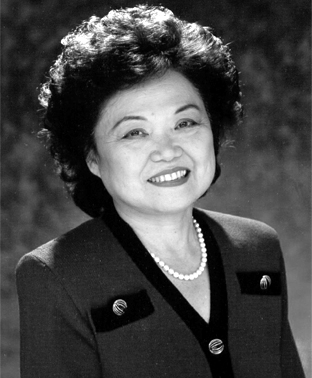Patsy Mink
From dKosopedia
Patsy Takemoto Mink (b. December 6, 1928 — d. September 28, 2002), was born Patsy Matsu Takemoto, in Paia, Maui County. Mink was a member of the Democratic Party, Mink served in the U.S. House of Representatives for a total of twelve terms, representing the Hawaii's second congressional district, and is noted for co-authoring the Title IX Amendment of the Higher Education Act. Congress renamed Title IX Amendment of the Higher Education Act to become the Patsy T. Mink Equal Opportunity in Education Act in her honor. Mink won her last election after her death in 2002.
Contents |
Early Years
Mink attended Maui High School, where she ran for student body president during her junior year in high school and won. In 1944 she graduated Maui High as class valedictorian.
Mink then attended the University of Hawaii, but transferred to the University of Nebraska. Outraged by the University's segregated housing policy, Mink helped effect change in University of Nebraska's housing policies.
Because of illness, Mink returned to Hawaii where she finished her baccalaureate degree. She recieved degrees in zoology and chemistry from the University of Hawaii in preparation to enter medical school. In 1948, however, none of the twenty medical schools to which she applied accepted women. Switching careers, Mink obtained her Doctor of Jurisprudence in 1951 from the University of Chicago School of Law, one of the first women and Asian Americans to do so.
When she found no law firm that would hire a woman, Mink started her own firm. She became the first Japanese-American woman lawyer in Hawaii.
Political Career
In 1956, Mink was elected to the Territory of Hawaii House of Representatives. In 1958-1959 and 1962-1964, Mink served in the Territory's Senate.
In 1964, Patsy Mink was elected to the United States House of Representatives and began the first of six consecutive terms in the House of Representatives. Again, she was the first woman of color to be elected to Congress.
A leader in the Young Democrats and Americans for Democratic Action (an organization she would later head as national president), she worked with political activists like Phillip Burton and Alan Cranston.
In the 1960s, Patsy Mink took a strong stand against the Vietnam War before it was popular to do so. Elected to Congress in 1964, she was first minority woman to serve in the House of Representatives. It did not matter that Hawaii had a large military vote. Mink felt so strongly about our Vietnam involvement that she entered the 1972 Oregon presidential primary to voice opposition to the war in Vietnam.
Mink co-authored Title IX of the Education Amendments Act of 1972 which mandated gender equality in education. As a result of Tiltle IX's passage, millions of women were afforded greater access to education, school grants and scholarships, and athletic opportunities.
In 1971, Patsy Mink filed suit along with 32 other Members of Congress to force disclosure of reports on underground nuclear tests in the Aleutian Islands of Alaska. This case was later cited as precedent by the U.S. Supreme Court in its ruling for the release of the Watergate tapes under the Freedom of Information Act.
Mink was not a candidate for reelection to the Ninety-fifth Congress in 1976, but was an unsuccessful candidate for nomination to the United States Senate.
Mink was appointed assistant secretary of state for Oceans and International, Environmental and Scientific Affairs by President Carter in 1977. As assistant secreatry of state she helped strengthen the protection of whales and the regulations of toxic dumping and ocean mining.
After her service in the Carter Administration, Mink was elected to the Honolulu City Council (1983 - 1987). She served as the Council's Chairmain from 1983 until 1985.
In special election to fill the vacancy caused by the resignation of United States Representative Daniel Akaka, Patsy Mink was reelected to serve in the U.S. House and she was reelected to the seven succeeding Congresses
In the 107th Congress, she introduced legislation to create the East Maui National Heritage Area, to expand the Pu'uhonua O Honaunau National Historic Park, and to establish the Kalaupapa National Historic Park.
Passing
On August 30, 2002, Mink was hospitalized in Honolulu with complications from chickenpox. Her condition steadily worsened, and on September 28, 2002, Mink died in Honolulu of viral pneumonia. Hawaii and the nation mourned as President George W. Bush ordered all flags to be lowered at half mast in honor of her contributions towards the equal rights of Americans. Mink received a national memorial and was honored with a state funeral in the Hawaii State Capitol Rotunda attended by leaders and members of Congress. She is buried at the National Memorial Cemetery of the Pacific.
Mink's death occurred one week after the 2002 primary election, too late for her name to be removed from the general election ballot. On November 5, 2002, Mink was roundly re-elected to Congress. Her vacant seat was filled by Ed Case after a special election on January 4, 2003.
External Links
- Patsy Mink (Wikipedia)
- Patsy Mink Coalition Builder for Greater Understanding (National Women's History Project)
- MINK, Patsy Takemoto, 1927-2002 (Biographical Directory of the US Congress)
- Gordon, Mike. Patsy Mink Honolulu Advertiser, July 2, 2006.
- In Memoriam: Patsy Mink Patsy Mink passed away on September 28, 2002 (National Organization for Women)
- A Photo Retrospective {Honolulu Advertiser, 9-29-04)
- Patsy Mink On the Issues (On the Issues)
- Lifetime Voting Record (Americans for Democratic Action)
- Women's Educational Equity Act (WEEA)
- House passes resolution to rename Title IX after Patsy Mink (US House of Representatives)

![[Main Page]](../../../../upload/banner-blue-135.jpg)